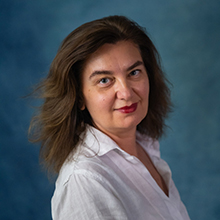What do you teach at Ca’ Foscari? What are your main research interests?
My name is Stefania Sbarra, I was born in Thiene in 1969 and I teach German literature. I am interested in the turning points and crises in German culture that literature transposes and conveys in its narrative and imagery. And there have been such moments in German-speaking countries since the 18th century. This is why I study Goethe, Kleist, Nietzsche and 19th-century novels, with a few detours into the 20th century and cinema.
Tell us about your academic path.
I studied at Ca' Foscari when Giuliano Baioni, the greatest of Italian Germanists, was teaching there. I made this decision after my high school German teacher lent me a book on Kafka: "Romanzo e parabola" (Novel and Parable). I graduated with him on Goethe and when I went on to do my PhD in German studies in Pisa, I kept working with him. I was a researcher in Ferrara for eight years, then I moved to Venice the year my son was born.
What are your professional role models / references?
As I said, Giuliano Baioni, but also Luciano Zagari, who taught at the University of Pisa: two Germanists with very different minds, but intellectually generous and extraordinary in their interpretation of literary texts.
Have you always known that this was going to be your path?
Yes, I have always thought that studying and teaching was my path, at least since high school. I only realised that I could do it at university level when I was writing my dissertation and nurturing the pleasure of reading, feeling an idea come to life and writing.
What is the aspect of your research you are most passionate about?
The infinity of a page of literature, which never closes the borders of its reading only when it is great. And the possibility to have, when studying German literature, an access to a second life outside national borders. I have always felt that, on average, Italians - and not only them - look at Germany, a country that is geographically very close, through the filter of stereotypes that blur their vision and prevent them from getting to know unexpected or even surprising aspects of contemporary German society.
What does teaching and researching mean to you?
Every year, when a new course begins and I enter the classroom, it is always like the first time, in terms of excitement. I like to look at the faces of students I don't know yet, and I am happy to be in the classroom, because I feel that I am in the right place for me. My primary ambition is that the students also feel they are in the right place from the very first class. As time goes by, I feel a growing gratitude for the life that has allowed me to work with young people and talk to them about literature. I even approach what I study in such a way that a woman or a man in his twenties can relate to it. Teaching them to dig deep into a page of literature in its original language: that is a moment of happiness for me.
What has given you the greatest satisfaction in your career?
There have been, but I do not like to name them publicly out of modesty. Ever since I read Nietzsche, the category of success has appeared suspect to me and today it is pervasive. However, I can say that my greatest satisfactions have always started from an idea that has lit up the eyes of who I was talking to.
The area you have always wanted to be involved in but have not yet had the opportunity to explore?
This is a very intimate question for me: I cannot answer it!
What would you say to young people starting their university career?
First of all, I would tell them something obvious, but which should not be so, which is to follow your intellectual passions and nurture them. And that if you do not have them, you must ask yourself why. Also, respect the university institution, get to know it closely and spend time in its halls, mainly to respect yourself and the choice you have made. And, lastly, always leave, in the proper sense and in the broader sense: always leave your home, knowing that even concentrating on reading a great book or a great poem is the first and best way to do so.
And to those approaching research today?
Research is a form of freedom, a never-ending intellectual adventure that requires enthusiasm and perseverance: it sounds like a paradox, but that is why it is not always easy.
Why Ca’ Foscari and Venice?
Italian German studies were born here, with Ladislao Mittner.
How can we understand Europe today?
I think that in order to understand Europe today, Germany has to be seen up close, from the inside. Of course, not only Germany: but it's a good start. I also believe that travelling to a country whose literature you don't know - at least the broad strokes - is like entering a museum with a blindfold on.

